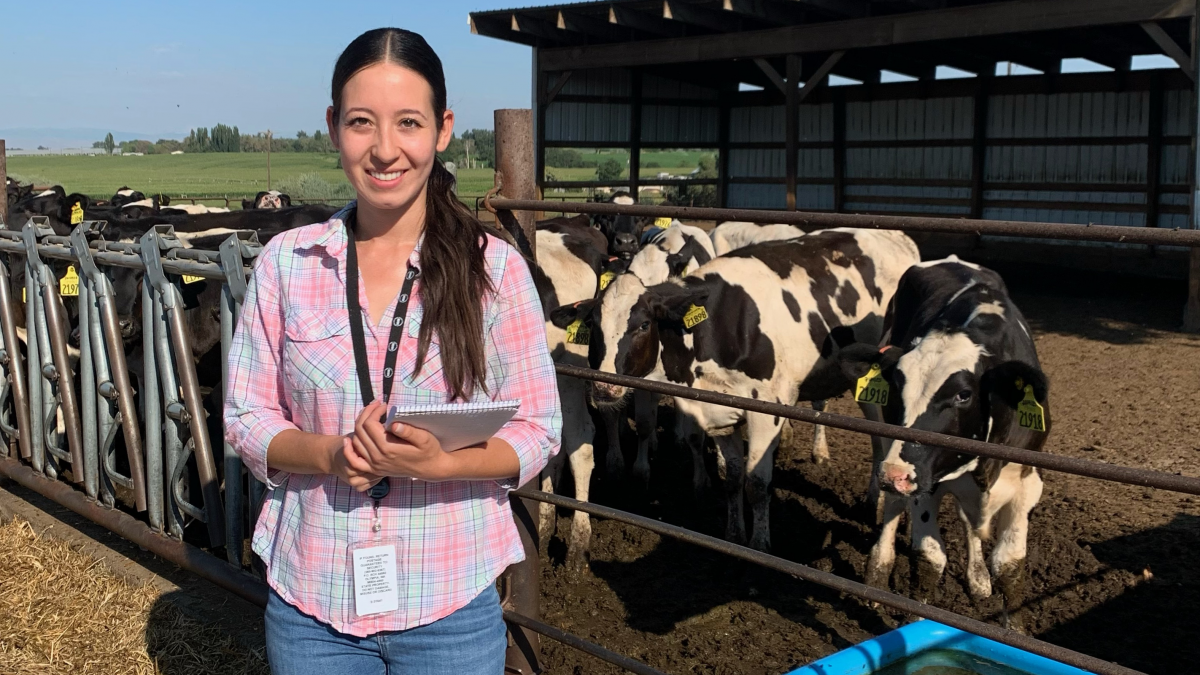Diana Marquez
MS, Applied Occupational Hygiene
Hometown
Grandview, WA
Future plans
A career with Washington State Department of Labor & Industries
“The most meaningful thing has been getting to change workers’ perspectives around the work we do in occupational health and safety.”
- Diana Marquez
Diana Marquez, an MS student in Applied Occupational Hygiene at the UW Department of Environmental & Occupational Health Sciences (DEOHS), recently spoke with us about her experience in the program and her internship this summer at the Washington State Department of Labor & Industries.
Learn more about our Applied MS programs in Environmental Health Sciences, which you can complete in as little as 15 months.
What motivated you to apply for the MS Applied program at DEOHS?
My parents both work in agriculture and my father handles pesticides. When I was growing up my dad would sometimes come home with rashes on his face after being exposed to pesticides. I would ask him, “Is there something going on in your workplace that they could improve so you could be more safe?”
I knew I wanted to do something in occupational health, but I didn't know if that meant going into the healthcare field. As an undergraduate at the UW, I took an industrial hygiene course with DEOHS Associate Teaching Professor Rick Gleason, and eventually majored in environmental health. I did my own research in the department, including an internship doing outreach to farmworkers with Northwest Communities Education Center and Radio KDNA.
I thought: How can I use these experiences to make a difference in my community? I felt I could use the master’s degree to eventually come work for the Washington Department of Labor and Industries (L&I) to help prevent more injuries from occurring in workplaces.
What have you enjoyed about the program so far?
I've enjoyed the combination of labwork, fieldwork and report writing. I like learning how to collect samples and operate the instruments we use during inspections. On the team where I am interning at L&I, I’m the only other person besides my supervisor who knows how to use those instruments. It feels like a real advantage to learn those things from the program.
What is the focus of your internship?
I’m interning with L&I in Union Gap, WA in a new region called region 10. I've been working with the safety inspectors and industrial hygiene inspectors. I've been learning a lot from them: how to investigate claims, ask questions and deal with problems.
We mainly visit job sites in fields like orchards and vineyards. A lot of workers’ claims right now involve employers violating the heat rule: for example, they’re having people work outdoors when it's over 89° F, and they're not providing shade or fresh water or giving them breaks every two hours. We've also seen a lot of pesticide exposures, and we inspect a lot of bathrooms.
We also anticipate hazards: when we go to workplaces, we always request their wildfire smoke protocol and training to make sure they're prepared.
What’s a day in the life at your internship like?
Recently, we've been getting a lot of heat in eastern Washington. That means workers start early and go home early, and we need to start inspecting even earlier. So on a typical fieldwork day I wake up between 5 and 6 am to get ready.
I drive to the workplace, and then we inspect—it takes three to six hours as we interview employees about the claims. It's out in the heat most of the time, so you have to be prepared. After that I work the rest of the day from home.
I've also been doing a lot of interpreting for some of the investigators. That’s been fun because I can build a personal relationship with the workers. It’s been nice being able to bridge the language and cultural barriers for some of the inspectors.
What have you learned from your internship or found most meaningful?
The most meaningful thing has been getting to change workers’ perspectives around the work we do in occupational health and safety, because a lot of the time they think that we're pro employer, and they don't feel like they're being protected.
When I talk to them, I tell them, “I'm here for you. When you're here, I see my dad.” And sometimes they get teary eyed.
It's been really meaningful, when they start building trust with you, and they start telling you some of the issues they're having at their workplace.
What do you hope to do after graduation?
My ultimate goal is to work for L&I. Actually, today my boss called me to say they're letting me apply for a position on the region 10 team. So once I graduate in March, it would be a really easy transition.
It's exciting, because I feel like I bring a lot of unique experiences to the team, and a lot of skills and knowledge that I've been able to gain through the program at UW.
Any tips for people applying to the MS Applied program?
Make sure your vision aligns with the program’s mission.
Talk to your instructors. They can give you insights into what type of work you can do through this program.
Share your application with peers and individuals that truly know you—they will give you great feedback on your essay!
Marquez received funding from the Northwest Center for Occupational Health & Safety.




